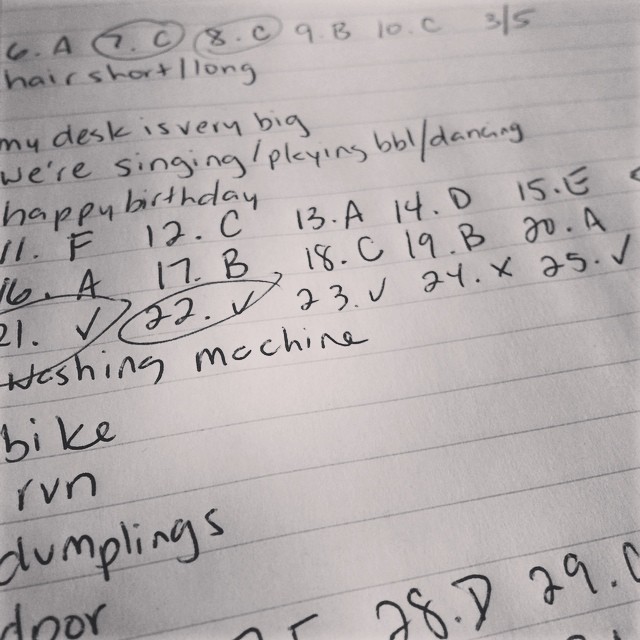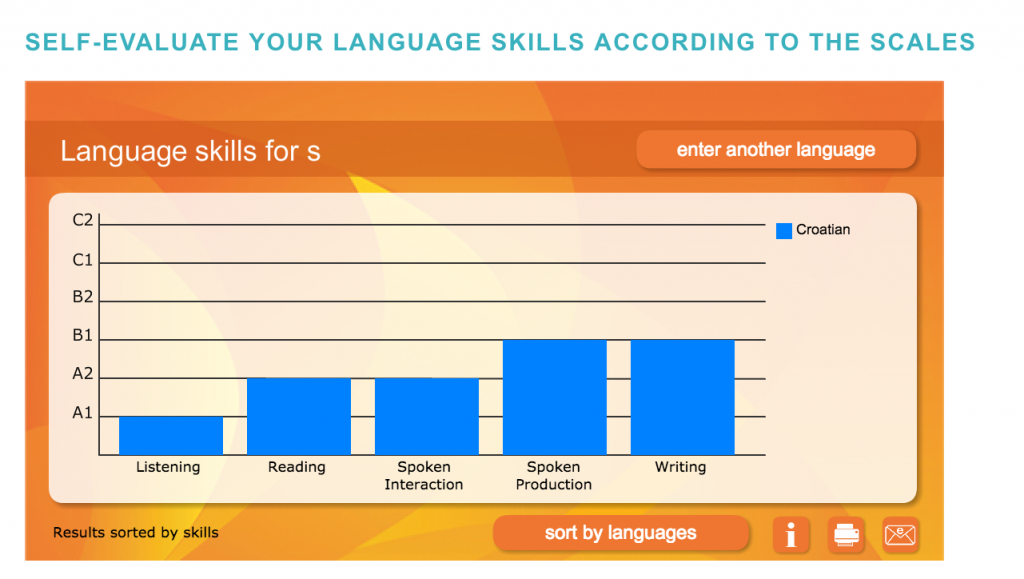What Is the Reading Level for First Grade
CEFR Levels: What They Are, Why They Thing, and How to Test Yourself
CEFR levels: what are they? And exercise they matter?
In the language-learning community, we often hear other learners throw around certain terms when they're talking about their level in a language.
"I speak High german at a B1 level" or "I'm an A2 in Russian."
But what practise B1 and A2 hateful?
These descriptors are skill levels in the CEFR arrangement and they're used by language learners to measure their ability in a language.
What are the Different CEFR Levels?
The Common European Framework of Reference for Languages, ofttimes referred to as CEFR or CEFRL, is an international standard for working out your ability within a language. It was established by the Council of Europe and aims to validate language ability.
The vi levels within the CEFR are A1, A2, B1, B2, C1 and C2. With these levels, you can easily piece of work out your power in around xl different languages.
The levels are often used casually by linguistic communication learners to explain their power at speaking, reading, writing and agreement a language. But there are also exams and certificates available to those who want to make their level official.
Permit'due south beginning take a look at what the different levels are and what's possible for y'all at each level.
The "A" Levels: Bones User
A1 | Beginner
At the A1 CEFR level, a linguistic communication learner can:
- Understand and use very basic expressions to satisfy concrete needs.
- Introduce themselves and enquire others questions nearly personal details.
- Interact simply as long as the other person speaks slowly and clearly.
A2 | Elementary
At the A2 CEFR level, a language learner can:
- Understand often used expressions in most intermediate areas such every bit shopping, family unit, employment, etc.
- Consummate tasks that are routine and involve a directly commutation of information.
- Describe matters of immediate need in simple terms.
The "B" Levels: Independent User
B1 | Intermediate
At the B1 CEFR level, a linguistic communication learner can:
- Empathise points regarding family unit, piece of work, school or leisure-related topics.
- Deal with most travel situations in areas where the language is spoken.
- Create simple texts on topics of personal interest.
- Describe experiences, events, dreams, and ambitions, as well as opinions or plans in cursory.
B2 | Upper Intermediate
At the B2 CEFR level, a linguistic communication learner tin:
- Understand the principal ideas of a complex text such as a technical piece related to their field.
- Spontaneously interact without too much strain for either the learner or the native speaker.
- Produce a detailed text on a wide range of subjects.
The "C" Levels: Practiced User
C1 | Advanced
At the C1 CEFR level, a language learner can:
- Empathize a wide range of longer and more demanding texts or conversations.
- Express ideas without too much searching.
- Finer use the language for social, academic or professional situations.
- Create well-structured and detailed texts on circuitous topics.
C2 | Proficiency
At the C2 CEFR level, a language learner tin can:
- Empathize nearly everything read or heard with ease.
- Summarize information from a variety of sources into a coherent presentation.
- Limited themselves using precise significant in complex scenarios.
Here'south a video of Benny Lewis, founder of Fluent in iii Months, explaining the CEFR levels:
When practice the Different CEFR Levels Affair?
The CEFR is frequently used by employers and in academic settings.
You may need a CEFR document for:
- Schoolhouse admissions
- University form requirements
- Employment
A CEFR document is very handy for your CV or résumé, and they often don't expire.
That said, many linguistic communication learners utilise CEFR levels for cocky-cess so that they can more clearly define what they need to work on, and work out what they would similar to achieve in their target language.
Aiming for higher CEFR levels are also a great style to make the transition from an intermediate learner to an advanced learner, and Fluent in 3 Months founder Benny Lewis has used exams in the past to force himself to improve and refine his language skills.
If you lot're looking for an extra push or for a way to break through a plateau, a language exam could exist an constructive way to practise it. Motivation in language learning e'er matters.
When do CEFR Levels non Matter?
Outside of the professional person or academic realm, CEFR levels are not as important. They're actually only necessary if you lot desire to ascertain where you lot're at with your target language. In a more casual language-learning surround, or when you're just learning languages because you bask them, and so CEFR levels are just another tool to assist with your language learning.

Sitting an exam requires a lot of written report. If your goal is speaking a language, that time you spend reading, listening and writing to meet the exam requirements volition be time you lot could have used to improve your speaking skills.
In the past I've done exams for High german, French and Italian as well as the HSK test for Mandarin Chinese. In grooming for all these exams, I had to study materials that were completely unrelated to my end goals for the languages.
And so, if your language-learning goals do not marshal with the CEFR calibration, and you don't need a professional person qualification, then y'all tin safely ignore it.
How do You Work Out Your CEFR Level?
There are a few ways you can work out your CEFR level. Many learners opt for self-cess, using the descriptions I shared above to judge where they're at.

For those looking for something a little more formal, you have the option of taking an official exam or a free online examination.
It's worth noting that CEFR levels cover a diverseness of skills. A full CEFR exam typically measures skills in listening, reading abilities, speaking, writing, translating and interpreting. That's why some learners segment their abilities, for example stating that their listening in a language is at a B2 level but their speaking is but at a B1 level. Others just average out their abilities and say that they're at a B1 level overall.
CEFR Assessments and Tests Available
Some of your options for official examinations (or for courses with certification) include:
- Alliance Française for French.
- Goethe Institut for German.
- Teastas Eorpach na Gaeilge for Irish gaelic.
- Instituto de Cervantes for Spanish.
- CELI for Italian.
- European Consortium for the Certificate of Attainment in Modern Languages for Bulgarian, Croation, Czech, English, French, High german, Hebrew, Hungarian, Italian, Polish, Romanian, Russian, Serbian, Slovak, and Spanish.
- TELC for English, High german, Turkish, Spanish, French, Italian, Portuguese, Russian, Polish, and Arabic.
- Πιστοποίηση Ελληνομάθειας for Modern Greek.
- Language Testing International for multiple languages.
- Lingoda for Spanish, French, German language, and English.
- ALTE for many other languages.
Online exams include:
- Exam English for English.
- Deutsche Welle for High german.
- Cambridge English language Language Assessment for English.
- Cambridge Institute for English, Spanish, German, and French.
- Language Level for English language Spanish, French, and German.
- Macmillan Do Online (paid) for English language.
- European Center for Modern Languages for self-assessment in a variety of languages.
Regardless of the examination you sit, linguistic communication exams demand intensive report and are a great style to push your ability in a language to that next level.
Source: https://www.fluentin3months.com/cefr-levels/
0 Response to "What Is the Reading Level for First Grade"
Postar um comentário